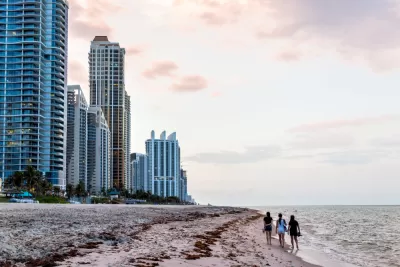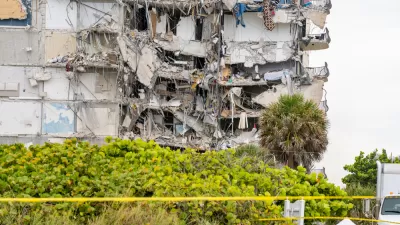A coastal geologist urges state leaders and residents to start planning for 'managed retreat' away from the coastal communities most vulnerable to sea level rise.

While climate change may not be directly related to the partial collapse in June of a condo building in Surfside, Florida, "the collapse has shone a spotlight on Florida’s unique vulnerabilities to climate change and raised questions about whether the state’s coastal infrastructure is equipped to handle the flooding that comes with sea-level rise." Zoya Teirstein interviews Randall W. Parkinson, a coastal geologist at Florida International University in Miami, who "thinks it’s already time to start thinking about moving residents away from the sea."
"By 2050," says Parkinson, "buildings in South Florida may be inundated by 2 to 3 feet of sea-level rise, plus 4 or more feet of storm surge." To him, "the collapse was a bellwether moment or a tipping point in the conversation, where for the first time, many more people are thinking more seriously about climate change in the coastal zone." Despite a reluctance on the part of most Floridians to consider managed retreat, Parkinson says the conversation is more essential than ever. "[T]hese current plans, they might hold the line for the next 30 years or so, but it’s just going to be untenable after that. And people are going to have to begin to make plans for how to withdraw and to ensure equity in the transition."
"Preventing future tragedies means acting now," Parkinson says. Otherwise, state and local leaders risk "having to make that decision when you have a major catastrophe." Floridians now face a critical decision: "You do nothing, you adapt (which is a temporary fix because eventually these low-lying coastal areas are all going to be underwater), or, at some point, people are going to have to think about a managed withdrawal from the coastline. Right now, it wouldn’t be managed; it would be total chaos."
FULL STORY: The Surfside tragedy could be a ‘bellwether moment’ for managed retreat

Planetizen Federal Action Tracker
A weekly monitor of how Trump’s orders and actions are impacting planners and planning in America.

Maui's Vacation Rental Debate Turns Ugly
Verbal attacks, misinformation campaigns and fistfights plague a high-stakes debate to convert thousands of vacation rentals into long-term housing.

Cuomo Is the Candidate of Both NIMBYs and Developers. What Gives?
In the New York City mayoral race, odd bedfellows align to preserve the housing status quo.

San Antonio and Austin are Fusing Into one Massive Megaregion
The region spanning the two central Texas cities is growing fast, posing challenges for local infrastructure and water supplies.

Charlottesville Temporarily Has No Zoning Code
A judge ordered the Virginia city to throw out its newly revised zoning code, leaving permitting for new development in legal limbo.

In California Battle of Housing vs. Environment, Housing Just Won
A new state law significantly limits the power of CEQA, an environmental review law that served as a powerful tool for blocking new development.
Urban Design for Planners 1: Software Tools
This six-course series explores essential urban design concepts using open source software and equips planners with the tools they need to participate fully in the urban design process.
Planning for Universal Design
Learn the tools for implementing Universal Design in planning regulations.
Heyer Gruel & Associates PA
JM Goldson LLC
Custer County Colorado
City of Camden Redevelopment Agency
City of Astoria
Transportation Research & Education Center (TREC) at Portland State University
Jefferson Parish Government
Camden Redevelopment Agency
City of Claremont




























